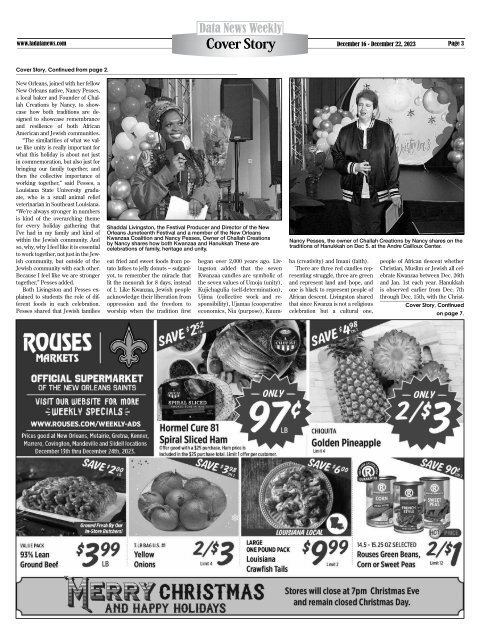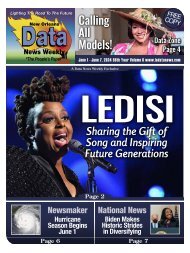Data News Weekly
e-Edition
e-Edition
You also want an ePaper? Increase the reach of your titles
YUMPU automatically turns print PDFs into web optimized ePapers that Google loves.
Cover Story<br />
www.ladatanews.com December 16 - December 22, 2023<br />
Page 3<br />
Cover Story, Continued from page 2.<br />
New Orleans, joined with her fellow<br />
New Orleans native, Nancy Pesses,<br />
a local baker and Founder of Challah<br />
Creations by Nancy, to showcase<br />
how both traditions are designed<br />
to showcase remembrance<br />
and resilience of both African<br />
American and Jewish communities.<br />
“The similarities of what we value<br />
like unity is really important for<br />
what this holiday is about not just<br />
in commemoration, but also just for<br />
bringing our family together, and<br />
then the collective importance of<br />
working together,” said Pesses, a<br />
Louisiana State University graduate,<br />
who is a small animal relief<br />
veterinarian in Southeast Louisiana.<br />
“We’re always stronger in numbers<br />
is kind of the overarching theme<br />
for every holiday gathering that<br />
I’ve had in my family and kind of<br />
within the Jewish community. And<br />
so, why, why I feel like it is essential<br />
to work together, not just in the Jewish<br />
community, but outside of the<br />
Jewish community with each other.<br />
Because I feel like we are stronger<br />
together,” Pesses added.<br />
Both Livingston and Pesses explained<br />
to students the role of different<br />
foods in each celebration.<br />
Pesses shared that Jewish families<br />
Shaddai Livingston, the Festival Producer and Director of the New<br />
Orleans Juneteenth Festival and a member of the New Orleans<br />
Kwanzaa Coalition and Nancy Pesses, Owner of Challah Creations<br />
by Nancy shares how both Kwanzaa and Hanukkah These are<br />
celebrations of family, heritage and unity.<br />
eat fried and sweet foods from potato<br />
latkes to jelly donuts – sufganiyot,<br />
to remember the miracle that<br />
lit the menorah for 8 days, instead<br />
of 1. Like Kwanzaa, Jewish people<br />
acknowledge their liberation from<br />
oppression and the freedom to<br />
worship when the tradition first<br />
Nancy Pesses, the owner of Challah Creations by Nancy shares on the<br />
traditions of Hanukkah on Dec 5. at the Andre Cailloux Center.<br />
began over 2,000 years ago. Livingston<br />
added that the seven<br />
Kwanzaa candles are symbolic of<br />
the seven values of Umoja (unity),<br />
Kujichagulia (self-determination),<br />
Ujima (collective work and responsibility),<br />
Ujamaa (cooperative<br />
economics, Nia (purpose), Kuumba<br />
(creativity) and Imani (faith).<br />
There are three red candles representing<br />
struggle, three are green<br />
and represent land and hope, and<br />
one is black to represent people of<br />
African descent. Livingston shared<br />
that since Kwanza is not a religious<br />
celebration but a cultural one,<br />
people of African descent whether<br />
Christian, Muslim or Jewish all celebrate<br />
Kwanzaa between Dec. 26th<br />
and Jan. 1st each year. Hanukkah<br />
is observed earlier from Dec. 7th<br />
through Dec. 15th, with the Christ-<br />
Cover Story, Continued<br />
on page 7.

















